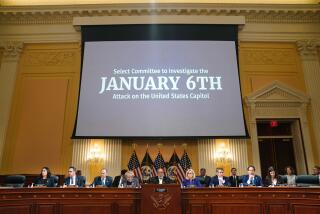Lobbyist Curbs Urged in Wake of Wedtech
- Share via
WASHINGTON — The Senate subcommittee investigating Atty. Gen. Edwin Meese III’s involvement with the scandal-plagued Wedtech Corp. recommended in a report released Wednesday that new restrictions be placed on lobbying by former Administration officials.
The bipartisan report called for disclosure of lobbying activities aimed at influencing executive branch decisions and a one-year ban on all lobbying in the executive branch by former high-level Administration officials.
“In looking under the Wedtech rock, the subcommittee has uncovered a picture of greed, influence-peddling and corruption,” said Sen. Carl Levin (D-Mich.), chairman of the Governmental Operations subcommittee on oversight of government management.
“While Congress can’t change human nature, by identifying flaws in our current government programs and procedures we can improve our chances that another Wedtech won’t happen,” Levin said.
Personal Intervention
The panel, whose principal findings were disclosed Wednesday in The Times, found that personal intervention by Meese and his former chief deputy, James E. Jenkins, was critical to the award of a $27-million Army contract and to Small Business Administration grants and loans to Wedtech. Meese at the time was counselor to President Reagan.
The report concluded that Meese and Jenkins, despite warnings from then presidential counsel Fred F. Fielding and Cabinet secretary Craig Fuller, violated a White House policy against intervening in government contracting.
Meese’s lawyer, Nathan Lewin, denied that Meese had acted improperly and said that his actions did not fall “within the scope of the White House regulation.”
Wedtech hired former White House official Lyn Nofziger and E. Robert Wallach, Meese’s personal friend, to lobby on its behalf.
Nofziger has been found guilty of violating the Ethics in Government Act by lobbying his former White House colleagues on Wedtech’s behalf within a year of leaving the government.
Wallach and Meese’s former financial adviser, W. Franklyn Chinn, face trial in New York on federal racketeering and conspiracy charges that include accepting funds to influence Meese.
Senate Approves Restrictions
Last month, the Senate approved a bill placing new restrictions on lobbying by former executive and legislative branch officials. The bill includes a provision similar to the subcommittee’s recommendation to prohibit senior White House officials, Cabinet secretaries and deputy secretaries from all government lobbying for one year after leaving office.
The House is expected to consider the bill this year.
The subcommittee also recommended several changes in the law concerning government procurement from small businesses owned by minorities. Wedtech, which was based in a low-income area of the South Bronx in New York City, received improper help from the Small Business Administration despite evidence that it did not qualify for the special exemptions for minority-owned firms, the subcommittee found.
Posts Go Unfilled
Meese, who left the White House in 1985 to become attorney general, has failed so far to fill several high-level Justice Department positions, including those left vacant after the resignations on March 29 of Deputy Atty. Gen. Arnold I. Burns and criminal division chief William F. Weld.
Burns and Weld quit out of concern that the year-long criminal investigation of Meese’s ties to Wedtech, along with other matters, had severely undermined the operations of the department.
More to Read
Inside the business of entertainment
The Wide Shot brings you news, analysis and insights on everything from streaming wars to production — and what it all means for the future.
You may occasionally receive promotional content from the Los Angeles Times.










